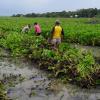What if you didn’t know your work schedule for next week? What if you didn’t know when you would be getting your paycheck? What if you couldn’t predict the things that affect your life so dearly? It would be hard, frustrating, and even scary. Unfortunately, something similar is happening in Kenya.
Due to climate change, weather has become unpredictable and Kenyans are suffering greatly. Since more than 70% of Kenyans depend on agriculture, these changes in weather patterns have made it almost impossible to farm and produce like they used to. As a result, it is affecting the lives of the Kenyans.
This is such an unfortunate occurrence because when we look at the nations who are causing climate change, no one can point to Kenya. As a matter of fact, we can’t even point at Africa as a whole. Africans are contributing almost nothing to the problem; it’s mostly developed nations such as the United States. When we look at gasoline consumption, the U.S. alone is consuming more than Europe, South America, Africa, and even Asia combined. Some Kenyans have even said, “We hate the fact that we are being punished for the things we have not done.” Everyone would agree that it isn’t fair. No one likes to get punished for nothing. As young kids with siblings, we hated getting in trouble because our brothers or sisters did something wrong. In the same way, because we are all part of the same world, Africa is like our sibling, and our African brothers and sisters are currently being punished because we, as Western brothers and sisters are doing something harmful.
Additionally, another problem is that many Americans still do not believe in climate change. Even though approximately 61% of the American and around 80% of Canadians believe that climate change is due to human activity, there are still many who do not believe this. It is understandable that many people still do not see climate change as a human-induced problem because we do not see the effects. It is hard to feel the effects of climate change as they do in Kenya because we can easily find food in markets whenever we need it. However, people in the Global South are experiencing it every day as their food depends on being able to predict the weather.
“Climate change is not a story… it’s a reality in Third World countries.” – Climate Conversation: Kenya videos
Climate change is affecting the poor first. Whether we are feeling its effects as much as Kenyan farmers is irrelevant—it is real. Just recently, we were in panic because we were afraid that Ebola would reach us. We never really worried about Ebola until it started to become a threat to us, but sadly, Ebola was already affecting the lives of thousands in West and Central Africa for months. So we should not treat climate change like Ebola. We shouldn’t wait until it starts to affect us. We need to do something to stop it before it starts to have a bigger impact on this world we live in and help Global South countries that are suffering from it today. Caring for creation is caring for the poor.
“We are the first generation to feel the impact of climate change and the last generation that can do something about it.” – Climate Conversation: Kenya videos
We need to take the responsibility to make a difference for the future. No one would want their children to suffer for what we have done. You wouldn’t want to leave your children with your debt. We would want to give them something that will help them. We can give them a cleaner world. It is not too late to make that happen.





The Reformed family is a diverse family with a diverse range of opinions. Not all perspectives expressed on the blog represent the official positions of the Christian Reformed Church. Learn more about this blog, Reformed doctrines, and our diversity policy on our About page.
In order to steward ministry shares well, commenting isn’t available on Do Justice itself because we engage with comments and dialogue in other spaces. To comment on this post, please visit the Christian Reformed Centre for Public Dialogue’s Facebook page (for Canada-specific articles) or the Office of Social Justice’s Facebook page. Alternatively, please email us. We want to hear from you!
Read more about our comment policy.